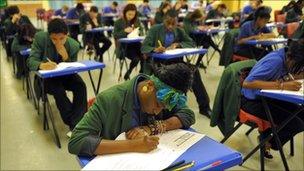Post-GCSE dropout fears despite predictions of success
- Published

Some 750,000 pupils are set to pick up GCSE results on Thursday
Thousands of GCSE students risk being lost to the education system because of a unique set of pressures, experts say.
Cuts to careers advice, the EMA support grant in England and fears over university fees, could lead many teenagers to drop out after they get their results on Thursday, they warn.
Brian Lightman of heads' union, ASCL, said heads faced a tough job to persuade pupils to stay on.
The government said no one should leave school unable to work or study further.
The warning comes as record GCSE results are predicted when they are released on Thursday.
Mr Lightman said: "The good news is we will have a very good set of results. This crop of students has studied extremely hard.
But he warned: "Sixteen-year-olds are facing unprecedented challenges at the moment as they hear a torrent of messages about the difficulty of accessing university places, increased tuition fees and youth unemployment.
"At the same time support services such as the Education Maintenance Allowance, Aim Higher and face-to-face careers guidance have been cut back."
Youth unemployment
Last week official figures revealed that one in five - or nearly one million - young people aged between 16 and 24 were out of work.
Mr Lightman continued: "The very real challenge that we will face is to convince them that staying on in education or training is the right thing to do, rather than dropping out and going for a very basic job.
"There are lots of people who are capable of aiming quite high but who will be questioning whether it is worth it."
He added that pupils were now having incredible difficulty in accessing good careers and advice services.
"Precisely what pupils need at this time is good face-to-face guidance to give them a route through the incredibly complex range of options."
He warned that 16-year-olds who had just completed their GCSEs could easily become confused and disheartened. Teenagers today felt "deeply unsettled", he claimed.
"What they need at this age of life is to be given confidence and hope - they have been told by all of us that working hard pays off," he added.
His fears were echoed by Paul Chubb, head of careers services body Careers England, who said the tough job market coupled with significant changes in government policy on support for young people was making things difficult for them.
He said many local authorities were already running down their careers services, known as Connexions, because they are ceasing to have a statutory duty to provide them from next year.
Instead that duty will pass to schools, who are being given no extra money to provide them. On a national level, pupils will only being offered careers advice online and over the telephone.
Mr Chubb said young people needed a "helping hand" from careers advisers with extensive local knowledge to book job interviews and appointments for them, adding that cutting this would be "heartless".
'At risk'
"If they don't get the results they hoped for then young people can become very concerned and anxious. The last thing we need is for young people not to be helped.
"What careers services and Connexions services have become first class at is identifying those youngsters most at risk of giving up by keeping in touch with them and persistently and gently cajoling them.
"This careers advice has become a vital part of preventing thousands of 16 and 17-year-olds from becoming lost to the system. They are incredibly vulnerable at this time.
"Who is going to do that now that in many places careers centres are closing and thousands of staff are losing their jobs," he added.
And there are warnings of a squeeze on A-level and other post-GCSE courses, as tens of thousands of university rejects are set to return to college to boost their grades next year.
Dan Taubman, of the University and College Union's lecturers' union, said the pressure on courses would be unprecedented.
"Sixteen-year-olds will compete with 18-year-olds who have A-levels but did not get into university."
Joy Mercer, policy director at the Association of Colleges, said: "At this time there is a lot of what seems to be very depressing news out there.
"But there are also lots of opportunities. What we feel is that every young person should have a right to have someone to take them through it."
A Department for Education spokesman said record numbers of 16 and 17-year-olds were already in education or training and that this was set to increase further.
He added that there were record numbers of university places and a large increase in apprenticeships this year.
He added that a new £180m bursary scheme, which is replacing EMA, will target support to thousands of 16 to 19-year-olds with genuine financial barriers to continuing their studies.
He added: "We make no apologies for giving schools responsibility for providing independent, impartial careers advice. They know their students best - so it's right they should decide what provision is right and that they have complete control over their budgets to buy in the support that pupils need."
- Published9 August 2011
- Published18 August 2011